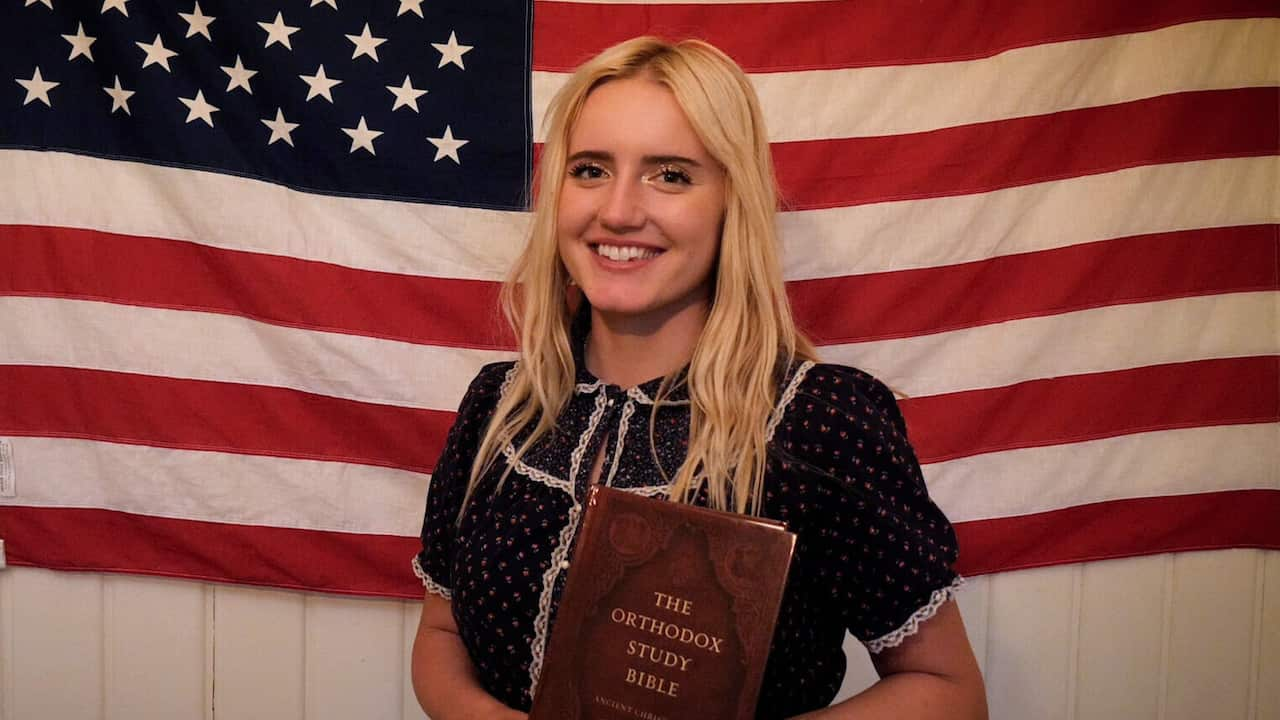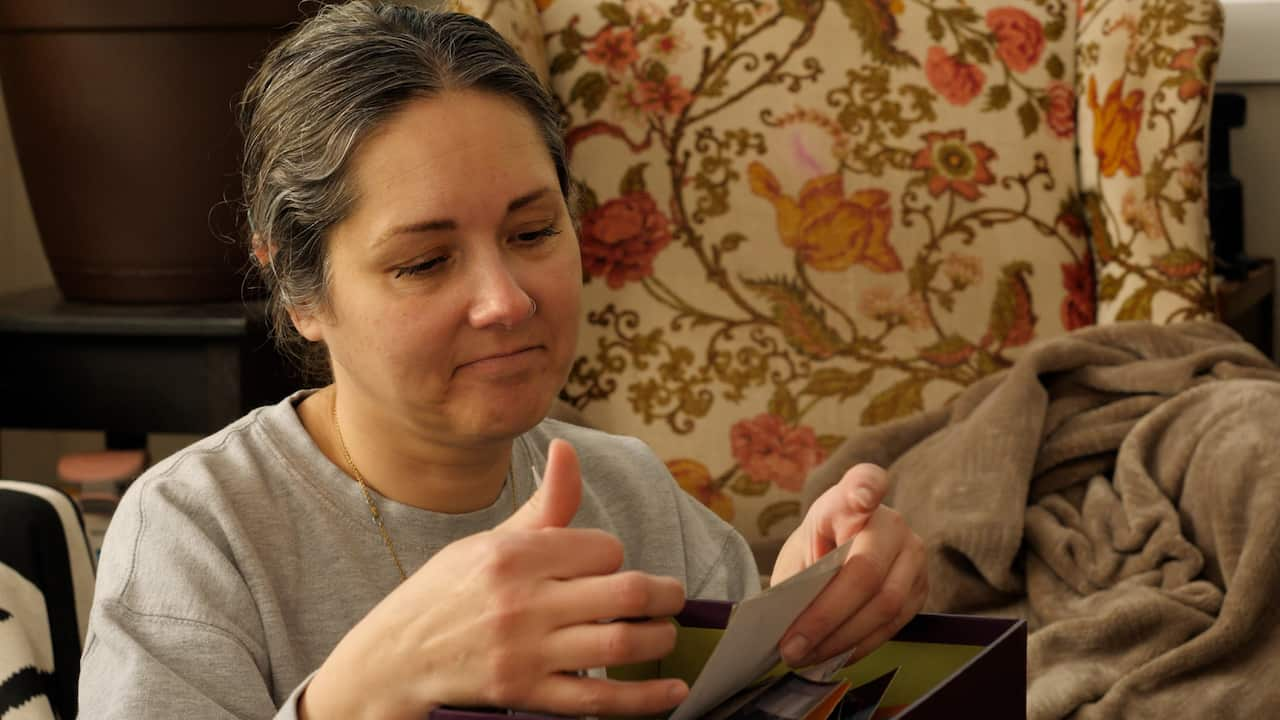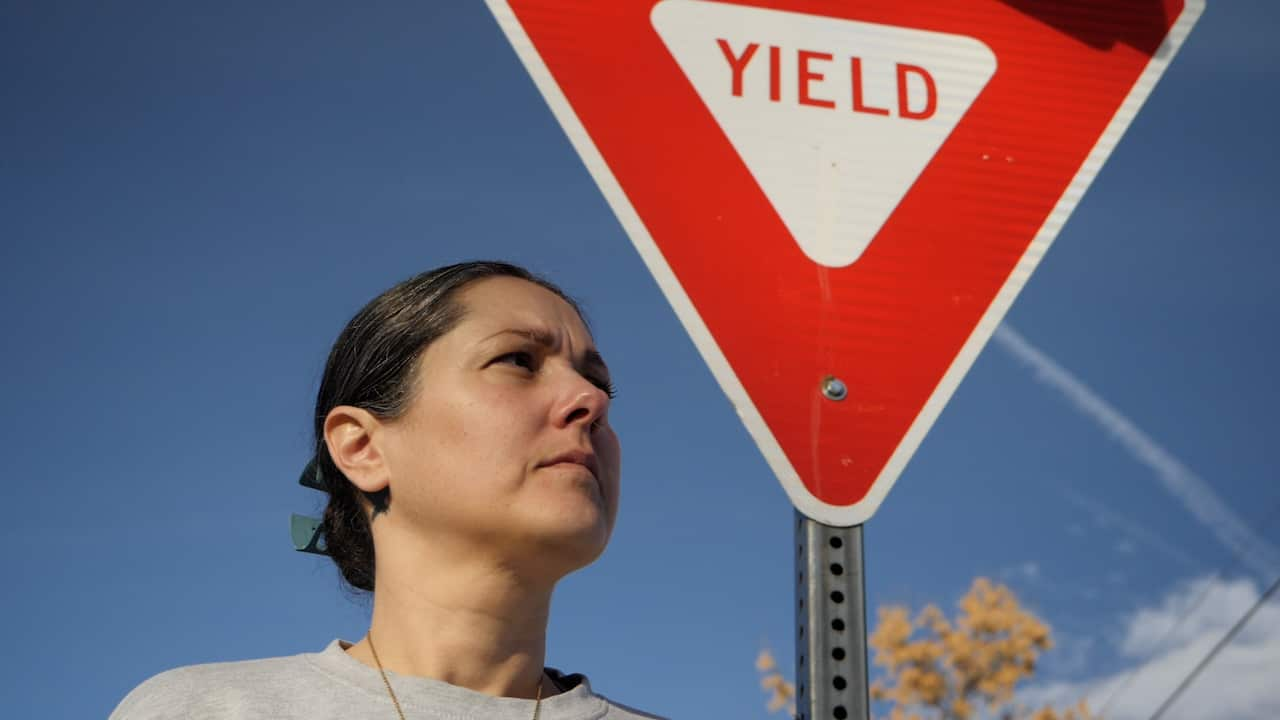Watch Dateline's latest episode, The Cult of Tradwives: Part One at 9.30pm AEST, Tuesday 16 September 2025, on SBS or SBS On Demand.
An hour south of the bright lights of Nashville, Tennessee, 20-year-old influencer Cali prepares her next meal. It's also her next social media post.
In her quaint country kitchen, she unscrews the lid of a jar of raw beef liver, shows a piece to the camera, picks it up and swallows it whole.
"I'm fertility-maxxing," she tells Dateline — and the camera in front of her.
'Fertility-maxxing' is a social media trend in which young women consume things such as raw meat and raw milk in the belief it will boost their fertility — though this is not proven by science and in fact can pose significant health risks.
Cali hopes it will prepare her body to bear children.
"I want 10-15 kids someday, God willing."
Her days are focused on fertility, faith, and farming. This trifecta is at the core of her "training" to become something called a 'tradwife', short for 'traditional wife'.
For Cali, being a tradwife also means embracing more traditionally feminine chores like "gathering eggs, milking the cow, cooking, churning butter, making ice cream..."
"I wouldn't see myself chopping wood or like building houses or anything," Cali says. "I think that's more like [an] advanced job."
She believes this delineation of gender roles is important in a time where women are "doing it all".
"I think that's kind of toxic," she tells Dateline.
Instead, Cali believes "all women should be, like … in the kitchen", she said with a laugh.
Wife supremacy? Trad living and its potential links to alt-right content
The 'tradwife' movement is filled with women like Cali, who've rejected careers in favour of returning to the kitchen and, crucially, posting about it online. They share scenes of homemaking, homesteading, and homeschooling, often donning 1800s dresses and preaching 1950s gender roles.
Cali describes the lifestyle of tradwives as a "stay-at-home mum, embracing homemaking duties, Biblical femininity, stuff like that".
There is one thing that separates Cali from many other tradwife creators though: she's single.
Despite this, Cali considers herself to be an aspiring tradwife and her content incorporates many of the hallmarks of traditional trad content.
Accounts like Cali's are emblematic of what the trad movement is: a revolt against the modern world and return to traditional living. But for critics of the broader trend of tradwife content, in some cases the paisley dresses and pastoral scenes are a pipeline to alt-right content.
They warn that the message of tradwives is regressive and anti-feminist, and following that algorithm leads you to a world of subjugation and extreme content. A rising number of accounts also promote outright misogyny, alongside racist content.
The tradwife movement is also closely linked with conservative Christianity and many tradwives — including Cali — view this lifestyle as Biblically ordained. According to Cali, women "were made to be mothers and wives" by God.

Online, the 'tradwife' trend first gained significant traction around the time Donald Trump was first elected US president in 2016.
Some social media influencers associated with the tradwife movement have audiences in the millions.
The influence of tradwives
On TikTok, there are more than 60,000 posts hashtagged tradwife, while on Instagram, there are more than 113,000 posts. Other popular hashtags in the movement include ‘tradwifeintraining' and 'tradwifelife'.
Tradwife content is in part so successful because it's "selling this escapist fantasy" according to Ruby Alexander, who has published a Masters of Philosophy thesis on the parallel movements of tradwives and birth strikers, women who are refusing to have children in response to climate change. She spoke to The Feed about the tradwife phenomenon in 2024.
"The reality of it is that it's financially inaccessible for the majority of women because it's not really possible for a family or a couple, or an individual even, to survive on one salary in the cost of living crisis," she said.
She said tradwife content monopolises on a nostalgia Western countries have for the 1950s as a "[perceived] perfect era" when women are assumed to have had more time to spend with children, and not expected to work, but adds "that's a contested history".
"The 1950s housewife was only accessible to upper and middle-class white women."
For Cali, the movement is about reviving conservative values that she believes help hold the family unit together. She says her parents' divorce has a significant effect on her desire to become a tradwife.
"I wasn't really raised with a mom per se, like she was always around, but just working all the time as a nurse," she said.
"I just knew since a young age like this is not how I will do it."
The traditional life has given Calli hope that marriage can last.
But for some women who've tried the trad life, the reality tore their families apart.
Abandoning the trad life
Enitza Templeton, 41, lived as a tradwife for 10 years.
"My whole entire life was dedicated to perfecting the craft of anything domestic, cleaning, cooking, decorating … Anything and everything domestic was my domain," she told Dateline.
She sits in her Denver home, looking at photos of her wedding day, reminiscing about the more than 10 years she spent in a traditional marriage that she says nearly destroyed her.

Born to Puerto Rican parents, Enitza was raised as an evangelical Christian. She says it had been instilled in her since childhood that a husband should have total authority over his wife.
"I remember I'd have conversations with my dad like: 'oh, I think being an attorney would be really cool'," Enitza said. "And his exact response was, ‘No, that's a man's job'."
Instead, Enitza went to a small college for graphic design and got a job in an executive suite, where she says she was keeping an eye out for a man to marry.
"Everything was secondary to just looking for a husband," she said.
After moving to Colorado, Enitza married a fellow believer and began her new life as a tradwife.
She started learning homemaking from her then mother-in-law, dressing conservatively, and devoting herself entirely to domestic duties. But over time, her sense of self began to whittle away.
"The curtains were perfect, and we had a fireplace … and I was very dead inside," she said.
"Knowing that I so actively and willingly did all that, it eats me up inside."
While her husband managed their finances and made all decisions in the house, Enitza said it was her job "to have as many babies as possible". After having four children, including one with complex health issues, she fell into a deep depression.
With the help of a close friend, Enitza made the decision to leave her marriage in 2019.
"I wanted to be the mom I dreamed of instead of the wife he wanted," she said.
"If I want my daughters to do any different, I'm going to have to show them different."
It was around this time, as she was embarking on her new life, that Enitza saw the tradwife trend started to take off on social media. Sharing custody of her children and relying on food stamps to make ends meet, the movement's growing moment spurred Enitza to create her own counter content.
She is now one of the most prominent anti-tradwife voices in the United States.
The curtains were perfect, and we had a fireplace … and I was very dead insideEnitza Templeton
Potential harms of tradwife content
According to Enitza, the trad movement's core principle of submission to men can expose women to coercive control and abuse. She says women like Cali are too young to know the true terror that awaits them.
"You don't see tradwives in their 40s," she said.

Enitza believes young women are blinded by the bucolic aesthetic of trad living and don't understand the real purpose of the movement.
"The goal is to create disciples who believe everything you believe so that the girls can grow up and continue serving and the men can grow up and continue leading."
More than just a way to promote traditional roles, Enitza notes that the religious teaching of the trad movement tethers women's salvation to their husband's satisfaction.
"So all of your performance, all of your cooking, all of your serving to your husband, if it's not good enough, well, where's your eternal salvation going to be? That's a f---ing cult."
Today, Enitza lives with her boyfriend, who she says she will never marry. She says she is unlearning the "traditional" standards set for her in her marriage and trying to unravel the example she set for her kids when they were younger.
"If it sounds too good to be true, it is."
With additional reporting by Kathleen Farmilo.
Dateline is an award-winning Australian, international documentary series airing for over 40 years. Each week Dateline scours the globe to bring you a world of daring stories. Read more about Dateline
Have a story or comment? Contact Us


